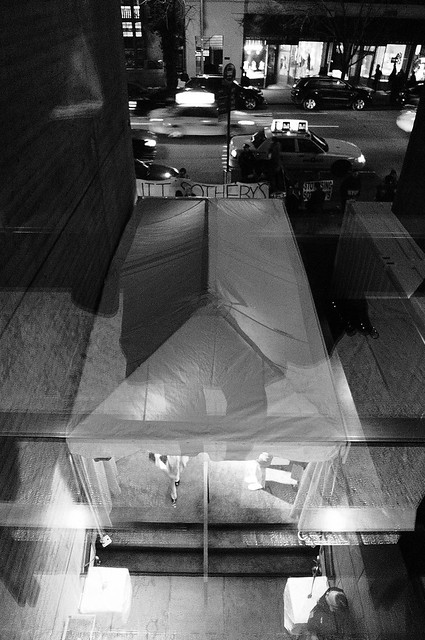i picked up a paperback copy of the hunger games at the jetblue terminal at JFK in early december; i tried to buy the sequels six hours later when joe and i touched down in phoenix, but the concessions at sky harbor had already shut down for the night (this is why you lost the war, phoenix), so i talked my mother in law into driving me to walmart* for them a few days later. catching fire and mockingjay are not, in the final analysis, worth a trip to walmart, but the hunger games could be; suzanne collins's writing is every bit as propulsive as stephenie "true love waits" meyer's, but collins uses a variety of adjectives, and her heroine's more than capable of taking care of herself. moreover, her adolescents' interactions have an authentically emotional crackle and snap that harry potter and friends never quite generate as they get older and lumpier, if you ask me; j.k. rowling nailed tween-harry's feelings in her first few books, but his teenage years with ron and hermione read like frodo and sam's wanderings in mordor circa the return of the king scotch-taped into a few episodes of saved by the bell.
but i digress. the hunger games is a winning, entertaining young adult book, and it had the potential to be an outstanding movie. several of the casting choices were brilliant (jennifer lawrence as katniss, stanley tucci as caesar flickerman, elizabeth banks as effie trinket, donald sutherland as president snow, lenny kravitz and his gold eyeliner as cinna), the pre-release marketing campaign was gorgeous (the capitol couture e-zine, with content from design houses like mcqueen and prada, is the most satisfying online tie-in since noel's website circa felicity**), and early footage was so promising!
it was not an outstanding movie, not by a long shot. jennifer lawrence was a fine katniss, and i think folks who argue that she looks too healthy to be a starved district 12 tribute can pipe down and netflix a bunch of off-putting skeletal-christian-bale movies, if that's what they're into (katniss is a hunter and is supposed to be in good shape, at least until the games start); the real trouble with the role is that her character's stoicism works in the novels because they're narrated in the first person and we get her vivid interior monologue.*** lawrence killed as a strong, silent type in winter's bone, but that film traded in shades of minimalism; it hurts me a little to say this, but i think the hunger games needed some substantial voice-overs. the audience needed to know how desperate katniss was in the flashbacks when peeta threw her the burned bread; lawrence did what she could with a look, but we needed the backstory of how his gesture gave her hope. that scene was choreographed badly, as were the few katniss shares with gale; we're supposed to get a lifetime of partnership and communion in that first hunting scene (to inform the awkwardness of gale's viewership later on), but it's hardly clear that he's essentially family. the sad-trombone cuts between gale at home in district 12 and peeta and katniss in the love cave were funny-awkward, not, er, awkward-awkward.
speaking of funny-awkward, can we talk for a moment about how peeta goes all pan's labyrinth on himself after hurting his leg so that katniss nearly steps on his face when she finds him near the river? that was true to the book, and it was a nice detail - peeta's a baker's son and a cake-icin' machine, so he was a quick study at camouflage during the pre-games training - but shouldn't he have been halfway underneath something? did the makeup team really take a good look at that tree-face and pronounce it badass? paint me skeptical; our theater laughed.
but enough about my hunger games; how did it strike you?
imaginary reading group discussion questions
01 have you seen "lana del rey's 'hunger games'"? go ahead, i'll wait.
02 have you seen battle royale (the 2000 japanese movie to which, as umpteen critics have noted, suzanne collins's books bear striking similarities)?
03 did you read any of the suzanne collins books? if so, how many?
04 do you think the movie would have benefited from more exposition - or, as i've argued, more narration?
05 should the violence in the arena have been more explicit? did the fact that the tributes' bodies remained in place (instead of being whisked away as they are in the books) serve a dramatic purpose?
06 would you have stepped on peeta's face?
07 did anyone dress up at your screening? if you were to costume yourself as a hunger games character, which one would you pick (and what would you wear)?
08 should the filmmakers have gone for broke with the mutant dogs and given them the fallen tributes' eyes?
09 will you see the next movie?
*walmart in their town has an LDS book section. i hid some things there.
**please note, however, that i am not one of the felicity people. i have my pride.
***"Dystopian fiction," laura miller writes in "fresh hell," the new yorker essay that convinced me to pick up hunger games in the first place, "may be the only genre written for children that’s routinely less didactic than its adult counterpart. It’s not about persuading the reader to stop something terrible from happening—it’s about what’s happening, right this minute, in the stormy psyche of the adolescent reader."


